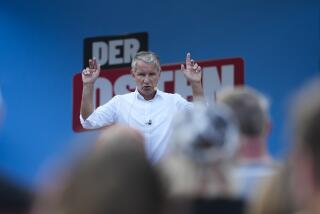Angry Irish voters expected to pummel ruling party
Reporting from London â An angry populace, a longtime ruler running scared, a major political shift in the making: You donât have to look for this combustible mix only in the Arab world.
Voters in Ireland went to the polls Friday in elections that all indicators show will wreak a terrible vengeance on the countryâs ruling party, Fianna Fail, which has been in power for 61 of the last 79 years.
Public outrage over a decimated economy and a humiliating international financial bailout has put the party on course for the worst electoral defeat in its history, a thrashing so thorough that analysts predict it will struggle to hold on to even a third of the parliamentary seats it won last time when final results become clear late Saturday or early Sunday.
The expected realignment of Irelandâs political landscape is linked to the nationâs spectacular economic implosion over the last three years, when a massive real-estate bubble popped, over-leveraged banks went into free fall and the so-called Celtic Tiger stopped dead in its tracks.
The Irish now face a jobless rate of more than 13% and a staggering budget deficit equal to nearly one-third of gross domestic product. A series of austerity plans, each more painful than the last, has shrunk incomes and slashed public-sector jobs. An estimated 1,000 residents are leaving Ireland every week, reviving the specter of mass emigration.
Fianna Fail, whose latest stretch in government began in 1997, has borne most of the blame.
âItâs expected to lose somewhere in the region of 40 to 50 seats in Parliament. In a Parliament of just 166 seats, this is very significant,â said Theresa Reidy, a professor at University College Cork in southern Ireland. âWeâve never seen a political party lose that many.â
Analysts expect a new ruling coalition made up of the main opposition party, Fine Gael, and the Labor Party. The leader of Fine Gael, a genial but uncharismatic former teacher named Enda Kenny, is the front-runner to become prime minister.
The elections are being closely watched in Europe because of their potential effect on the $113-billion bailout that Dublin negotiated in November with the European Union and the International Monetary Fund. Ireland became the second nation in seven months, after Greece, to be rescued in an attempt to shore up the euro.
Opinion polls show that many Irish find the terms of the bailout package, including more austerity measures and a high interest rate on the loans, too harsh.
They also see it as an unacceptable loss of sovereignty for a nation that fought a long and bloody campaign for independence from the British throne. That perception too has cost Fianna Fail.
âIts byline is âFianna Fail, the republican party.â Itâs always had a very strong republican base,â Reidy said. âSo the arrival of the IMF and the perceived loss of sovereignty has eroded a lot of their support base.â
Such is the depth of public anger against the bailout that the three biggest parties, including Fianna Fail itself, have made renegotiation of the package part of their campaigns.
But none is expected to push for drastic changes, only some tinkering around the edges, such as lowering the interest rate or lengthening the period over which loans must be paid back.
In some ways, analysts say, a coalition of Fine Gael and Labor wonât be drastically different from Fianna Fail; many of the policies of the three parties are similar. Fine Gael and Labor are mainly capitalizing on votersâ desire to punish the party that presided over Irelandâs bust and has dominated the political scene for most of Irelandâs history.
On the campaign trail this week, Kenny blamed Fianna Fail for âthe national confidence trick pulled on us by the government and those they ceded power to: developers and banks.â
âIâm asking people to turn their anger into action and vote with their power, vote with their pride, vote for our plan.â
More to Read
Sign up for Essential California
The most important California stories and recommendations in your inbox every morning.
You may occasionally receive promotional content from the Los Angeles Times.











